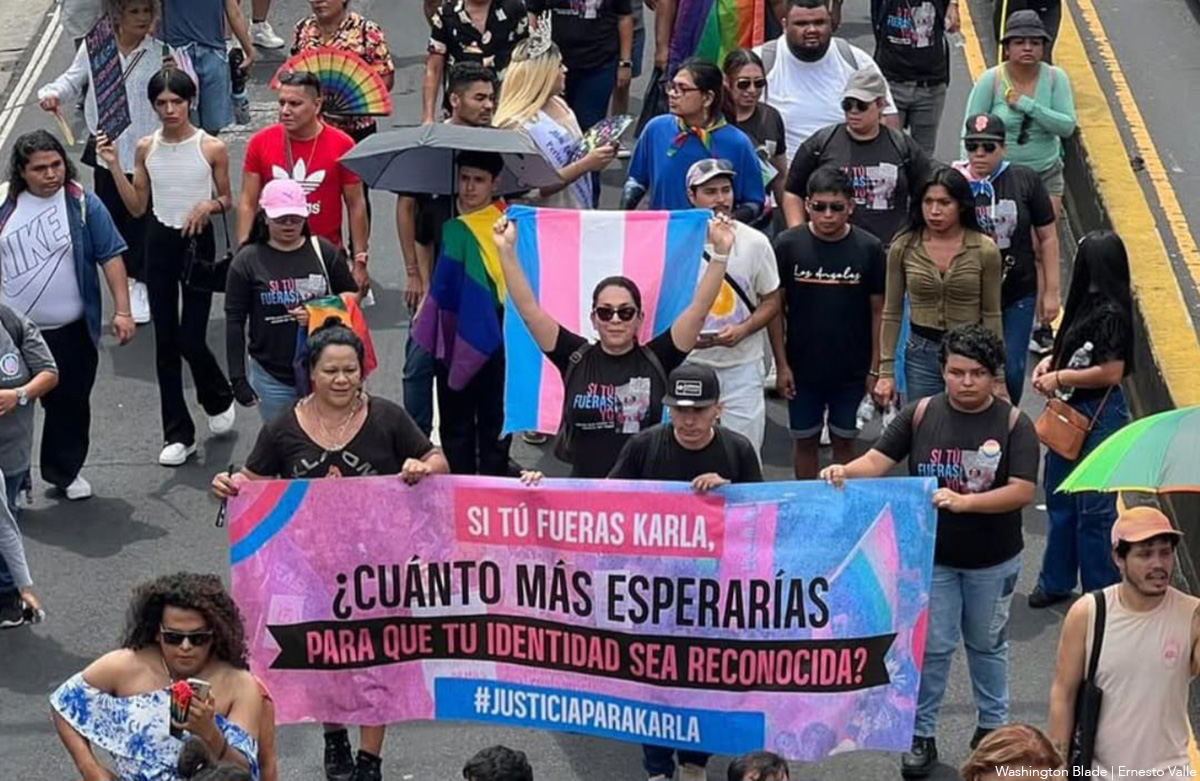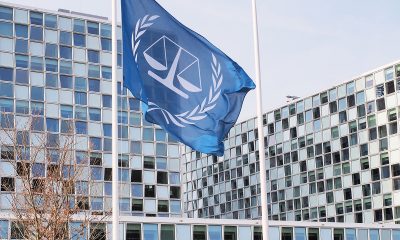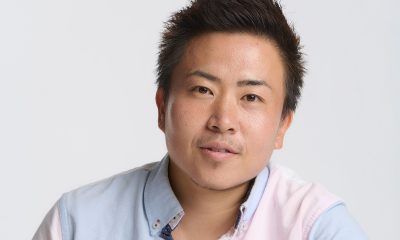World
ICC for first time recognizes LGBTQ people as victims of gender persecution
Chief prosecutor to seek arrest warrants for Taliban leaders behind human rights abuses

The International Criminal Court on Jan. 23 for the first time recognized LGBTQ people as victims of gender persecution under international criminal law.
Karim Khan, the ICC’s chief prosecutor, announced a request for arrest warrants against Taliban officials accused of targeting women and others perceived as defying the group’s strict gender norms in Afghanistan. It is the first time LGBTQ people have been explicitly named as victims in a gender persecution case before the court.
Since the Taliban’s takeover of Afghanistan in August 2021, there has been a significant escalation in the repression of LGBTQ people and women. A report that Human Rights Watch released in 2022 documented nearly 60 cases of targeted violence against LGBTQ people in the months following the Taliban’s return to power.
The Washington Blade in October 2022 reported the Taliban have frequently used the contents of seized cell phones to track and target LGBTQ people, further intensifying the climate of fear, and violence against the community in Afghanistan.
In its February 2023 report, “A Mountain on My Shoulders: 18 Months of Taliban Persecution of LGBTIQ Afghans,” Outright International detailed how Taliban security officials systematically targeted LGBTQ people, especially gay men and transgender women, subjecting them to physical and sexual assault as well as arbitrary detention. The report also noted Taliban authorities had carried out public floggings for alleged same-sex relations, with the Taliban Supreme Court publicly defending these punishments on social media at the time.
The report indicates Taliban officials had escalated their efforts to target LGBTQ people, making it a greater priority. They collected intelligence on LGBTQ activists and community members, hunted them down, and subjected them to violence and humiliation as part of their systematic campaign of repression.
Khan has sought charges against the Taliban’s Supreme Leader, Haibatullah Akhundzada, the Taliban’s supreme leader, and Chief Justice Abdul Hakim Haqqani for crimes against women, girls, and LGBTQ people. Khan said there are reasonable grounds to believe that Akhundzada and Haqqani orchestrated systematic violations of fundamental rights, including physical integrity, autonomy, free movement, free expression, education, private and family life, and free assembly.
Khan further detailed that the Taliban’s persecution was committed in connection with other crimes under the Rome Statute, including murder, imprisonment, torture, rape and other forms of sexual violence, enforced disappearance, and other inhumane acts.
Reports indicate the Taliban has banned education for girls beyond sixth grade, severely restricting their access to education and limiting employment opportunities in health and education sectors. Taliban members have also beaten, detained, and tortured women who participated in protests in support of their rights, and have carried out violent attacks against LGBTQ people.
Khan’s requests have been submitted to a pretrial chamber comprising three ICC judges, who will decide whether to issue the warrants. The ICC initially authorized the Afghanistan investigation in March 2020, following a preliminary examination that began in 2007. The investigation, however, was paused for several years as the prosecutor and ICC judges considered a request by Afghanistan’s former government to defer ICC proceedings in favor of domestic prosecutions the government claimed to be pursuing.
The judges noted any cases pursued by the former Afghan government represented, at most, a “very limited fraction” of those falling within the scope of an ICC investigation. They also observed that the current government displayed no interest in upholding the deferral request. The ICC, as a result, authorized the resumption of the investigation in October 2022.
“This is a historic moment since it is the first time in history that the ICC has officially recognized the crimes committed against LGBTIQ+ people. This application for an arrest warrant sends a strong message that the international community rejects the gender persecution of LGBTIQ+ people,” said Artemis Akbary, executive director of the Afghanistan LGBTIQ Organization. “LGBTIQ+ people in Afghanistan need our support and solidarity more than ever, and we must ensure that they have access to justice and accountability.”
Outright International in its press release stated this development marks a significant step toward addressing the unique vulnerabilities of LGBTQ people in conflict and crisis situations.
“The Taliban’s reign of terror over women and LGBTIQ people has been based on the assumption that gender persecution can persist with impunity. The ICC’s recognition of LGBTIQ victims challenges that presumption by recognizing the humanity of our communities,” said Outright International Senior Director of Law, Policy, and Research Neela Ghoshal. “Once arrest warrants are issued against Taliban officials, member states should support the court’s efforts to swiftly bring them to justice.”
Human Rights Watch International Justice Director Liz Evenson also welcomed Khan’s announcement.
“The ICC prosecutor’s request for arrest warrants against two senior Taliban leaders for the crime against humanity of gender persecution should put the Taliban’s oppression of women, girls, and gender nonconforming people back on the international community’s radar,” said Evenson. “With no justice in sight in Afghanistan, the ICC warrant requests offer an essential pathway for a measure of accountability.”
She added the “international crimes committed in Afghanistan are vast, but a broad approach to accountability is needed to break cycles of impunity that have led to more abuses.”
“ICC member countries should ensure the court has the backing and practical assistance it needs to expand its Afghanistan investigations,” said Evenson.
The Afghan Justice Ministry has not responded to the Washington Blade’s request for comment.
“It is truly groundbreaking for the International Criminal Court to recognize our communities among the victims and survivors of the most heinous crimes and their consequences, and to acknowledge gender identity and gender expression among the drivers of human rights violations,” said ILGA World Executive Director Julia Ehrt. “These warrants of arrest highlight human rights violations that civil society has long documented and that the world can no longer ignore.”
Spain
Spanish women detail abuses suffered in Franco-era institutions
Barcelona-based photographer Luca Gaetano Pira created ‘Las Descarriadas’ exhibit

A Barcelona-based photographer, audiovisual artist, and activist has created an exhibit that profiles Spanish women who suffered abuse in institutions that Gen. Francisco Franco’s dictatorship established.
Luca Gaetano Pira, who is originally from Italy, spoke with women who the regime, which governed Spain from 1936-1975, sent to Women’s Protection Board institutions.
The regime in 1941 created the board the country’s Justice Ministry oversaw.
Franco named his wife, Carmen Polo, as the board’s honorary president. Then-Prime Minister Felipe González fully dissolved the board in 1985, a decade after Franco’s death.
Gaetano’s exhibit is called “Las Descarriadas” or “The Misguided Women” in English.
“These are women who were detained between 1941 and 1985 for reasons that are unthinkable today: being lesbian, poor, pregnant out of wedlock, rebellious, politically active … or simply considered ‘morally suspect,'” Gaetano noted to the Washington Blade.
Groups affiliated with the Spanish Catholic Church ran these institutions. Gaetano pointed out they were “presented as social assistance centers.”
“In reality, they were spaces of punishment and forced reeducation, where isolation, unpaid work, and psychological violence were the norm,” he said. “Many of the survivors are still alive. Their testimonies are powerful, urgent, and of extraordinary current relevance.”
The regime sent more than 40,000 women to Women’s Protection Board institutions.
“Despite its seemingly benevolent name, it was in fact one of the most powerful instruments of moral and social control over women during and after the dictatorship,” notes the exhibit. “Under the guise of care and re-education, this institution functioned as a repressive apparatus that punished women who deviated from the ideal feminine model imposed by Franco’s regime: submissive, obedient, married, and dedicated to motherhood within the Catholic family structure.”
The Spanish Catholic Church last month issued a public apology, but Gaetano described it as “very soft” and noted “the women did not accept it.” Gaetano also compared the Women’s Protection Board institutions to Ireland’s Magdalene Laundries.
The Associated Press notes tens of thousands of “fallen” women were sent to the laundries that Catholic nuns operated in Ireland from the 18th century until the mid-1990s. Then-Irish Prime Minister Edna Kenny in 2013 issued a formal apology for the abuses that women suffered in the laundries and announced the government would compensate them.
The Spanish government has yet to offer compensation to the women abused in Women’s Protection Board institutions.
“My work focuses on recovering the historical memory of marginalized communities, particularly through the portrayal of survivors of institutional violence and the use of archival materials,” Gaetano told the Blade, noting he has also sought to highlight the repression that LGBTQ people suffered during dictatorships in Portugal and Latin America.
Gaetano’s exhibit can be found here:
Afghanistan
ICC issues arrest warrants for Taliban leaders over persecution of LGBTQ people, women
Groups ‘non-conforming’ with group’s gender policy targeted

The International Criminal Court on Tuesday issued arrest warrants for two top Taliban officials accused of targeting LGBTQ people, women, and others who defy the group’s strict gender norms.
The warrants are for Hibatullah Akhundzada, the Taliban’s supreme leader, and Afghanistan Chief Justice Abdul Hakim Haqqani.
“Based on evidence presented by the Office (of the Prosecutor), the judges found that there are reasonable grounds to believe that they have committed — by ordering, inducing, or soliciting — the crime against humanity of persecution, under article 7(1)(h) of the Rome Statute, on gender grounds, against girls, women, and other persons non-conforming with the Taliban’s policy on gender, gender identity or expression; and on political grounds against persons perceived as ‘allies of girls and women,’” reads an ICC press release that announced the warrants.
Karim Khan, the ICC’s chief prosecutor, in January announced a request for warrants against Taliban officials over their treatment of women and other groups since they regained control of Afghanistan in 2021. The request marked the first time the court specifically named LGBTQ people as victims in a gender persecution case before it.
“The issuance of the first arrest warrants in the situation in Afghanistan is an important vindication and acknowledgement of the rights of Afghan women and girls,” reads the press release the ICC released on Tuesday. “It also recognizes the rights and lived experiences of persons whom the Taliban perceived as not conforming with their ideological expectations of gender identity or expression, such as members of the LGBTQI+ community, and persons whom the Taliban perceived as allies of girls and women.”
A report that Outright International released in 2023 notes Taliban officials have systematically targeted LGBTQ people — especially gay men and transgender women.
Taliban officials have subjected them to physical and sexual assault as well as arbitrary detention. The Outright International report also notes Taliban authorities have carried out public floggings for alleged same-sex sexual relations, and have collected intelligence on LGBTQ activists and community members.
Artemis Akbary, executive director of the Afghanistan LGBTIQ Organization, praised the ICC.
“Today is a historic moment for LGBTIQ victims and survivors,” he said on social media.
El Salvador
#JusticiaParaKarla: una lucha por el derecho a la identidad en El Salvador
Karla Guevara inició su camino legal y personal en 2020

Cinco años han pasado desde que Karla Guevara inició un camino legal y personal para lograr que su nombre y género sean reconocidos en su Documento Único de Identidad (DUI). Cinco años de sentencias, apelaciones, puertas cerradas y vulneraciones que hoy se resumen en una sola palabra: resistencia.
En medio de un país que aún arrastra estructuras jurídicas y sociales poco sensibles a las realidades trans, Guevara se ha convertido en una voz visible. No solo por la denuncia pública de su caso, sino por su capacidad de transformar el dolor en acción: ha iniciado la campaña #JusticiaParaKarla, la cual acompaña con conversatorios llamados “Si tú fueras yo” en diferentes zonas del país.
Su historia se remonta al año 2018, cuando, junto a otras tres defensoras de derechos humanos —Mónica Hernández, Bianca Rodríguez y Verónica López— interpuso una demanda para lograr el cambio de nombre legal. La acción se inspiró en la Opinión Consultiva 24/17 de la Corte Interamericana de Derechos Humanos, que obligó a los Estados miembros de la OEA a garantizar los derechos de las personas trans, incluyendo el reconocimiento de su identidad.
A diferencia de sus compañeras, cuyo proceso fue resuelto favorablemente, Guevara fue la única a quien el Estado salvadoreño le negó el derecho, incluso tras contar con una sentencia favorable. El camino ha sido empinado, desgastante y doloroso, y ha implicado múltiples etapas legales con resoluciones contradictorias.
El 8 de enero de 2020, el juzgado declaró su demanda improponible. Guevara apeló el 22 de ese mismo mes, pero la Cámara de Familia desestimó su recurso. Aun así, perseveró. En abril de 2021 presentó una segunda apelación, y en septiembre se revocó la decisión del juzgado, ordenando admitir su demanda. Una pequeña luz parecía abrirse.
En agosto de 2022, después de varios peritajes que, según Guevara, incluyeron momentos donde se sintió expuesta y violentada, recibió una sentencia favorable: se autorizaba su cambio de nombre y género en la partida de nacimiento. Sin embargo, esta victoria fue parcial y breve. Aunque se ordenó marginar su partida, no se ordenó cancelarla como en otros casos similares.
El 4 de octubre de ese mismo año, la sentencia fue enviada al Registro del Estado Familiar. Pero la respuesta institucional fue sorprendente: el 3 de noviembre, la Alcaldía de San Salvador se negó a realizar el cambio. El jefe del registro y el registrador presentaron un amparo ante la Sala de lo Constitucional, paralizando el proceso.
“No solo me lo negaron, sino que ahora me exponen a un juicio aún mayor”, expresa Guevara. La frustración y la indignación fueron creciendo. En febrero de 2023, presentó una denuncia ante la Fiscalía General de la República, aunque lo hizo con poca esperanza. “Temía que no harían nada”, dijo. Y el 16 de abril de 2024, sus temores se confirmaron: la Fiscalía archivó el caso alegando que “no existe delito que perseguir”.
El 19 de noviembre de ese mismo año, Guevara decidió acudir a instancias internacionales y presentó su caso ante la Comisión Interamericana de Derechos Humanos. La CIDH ya notificó al Estado salvadoreño y le otorgó un plazo de cuatro meses para responder por qué no ha ejecutado el cambio ordenado por el juzgado.
“Obviamente no van a dar respuesta”, lamenta Guevara. Lo dice con la voz entrecortada, como quien ya ha llorado mucho, pero no ha perdido la voluntad de hablar. Reconoce que el proceso le ha afectado emocionalmente. “Cada vez que hablo de esto se me corta la voz”.
Las heridas no solo vienen de las oficinas estatales, sino también de las calles. Las miradas, los comentarios, el momento de presentar el DUI en cualquier trámite. “Es como si cada vez tuviera que explicar mi existencia. Es un juicio constante sobre quién soy”.
Guevara no está sola. Reconoce que hay otras personas trans en la misma situación. “Lo preocupante es que solo pasa en algunas zonas del país. En otras ha habido casos exitosos”, afirma. La disparidad en el trato revela una preocupante arbitrariedad institucional.
Uno de esos casos exitosos es el de Valeria Mejía, coordinadora de monitoreo y evaluación de ASPIDH. Su DUI ya refleja su nombre identitario, aunque no su género.
“Cuando recibí mi DUI con el nombre que me identifico pensé: aquí empieza una nueva vida”, relata.
Para Mejía, el cambio fue profundamente simbólico. “Uno ve pasar toda su vida frente a los ojos. Toda la discriminación, todos los rechazos. Sentí que algo sanaba”. A pesar de ello, su género asignado al nacer sigue apareciendo en el documento, lo que le genera inseguridad.
“El problema es que tengo que ir a todas las instituciones donde aparezco con mi nombre anterior. En el Seguro Social, por ejemplo, aún estoy registrada con el nombre masculino y no pueden atenderme, aunque el número del DUI sea el mismo”, explica.
Casos como los de Guevara y Mejía visibilizan una problemática estructural: el Estado salvadoreño no garantiza de forma uniforme el derecho a la identidad de las personas trans. Las resoluciones favorables son solo el primer paso. Su implementación efectiva aún tropieza con prejuicios, burocracia y omisiones.
Con la campaña #JusticiaParaKarla, la activista busca más que una solución a su caso personal. Busca generar conciencia, exigir coherencia legal y empujar una transformación cultural. En la marcha del 17 de mayo contra la LGBTIfobia, su presencia se hizo notar con camisetas, banners y mensajes que interpelan directamente al sistema.
Guevara ha hecho de su cuerpo, su voz y su historia una herramienta de resistencia. En cada conversatorio de “Si tú fueras yo”, invita a imaginar, a empatizar, a incomodarse.
“Lo que me pasa a mí le puede pasar a cualquier persona trans. Y si el Estado no nos reconoce, nos niega también la posibilidad de existir plenamente”, expresa.
Hoy, la resolución está en manos de la CIDH y el tiempo corre. La lucha de Guevara ya no es solo por una partida de nacimiento. Es por el derecho a ser, a vivir sin miedo, a que el nombre que la representa no siga siendo un motivo de juicio, burla o rechazo.
Mientras tanto, sigue esperando. Sigue alzando la voz. Sigue sembrando esperanza en quienes vienen detrás. Porque como ella misma dice: “Esto no se trata solo de mí. Se trata de justicia”.
-

 Virginia2 days ago
Virginia2 days agoDefying trends, new LGBTQ center opens in rural Winchester, Va.
-

 South Africa5 days ago
South Africa5 days agoLesbian feminist becomes South African MP
-

 Travel4 days ago
Travel4 days agoManchester is vibrant tapestry of culture, history, and Pride
-

 Opinions3 days ago
Opinions3 days agoUSAID’s demise: America’s global betrayal of trust with LGBTQ people












